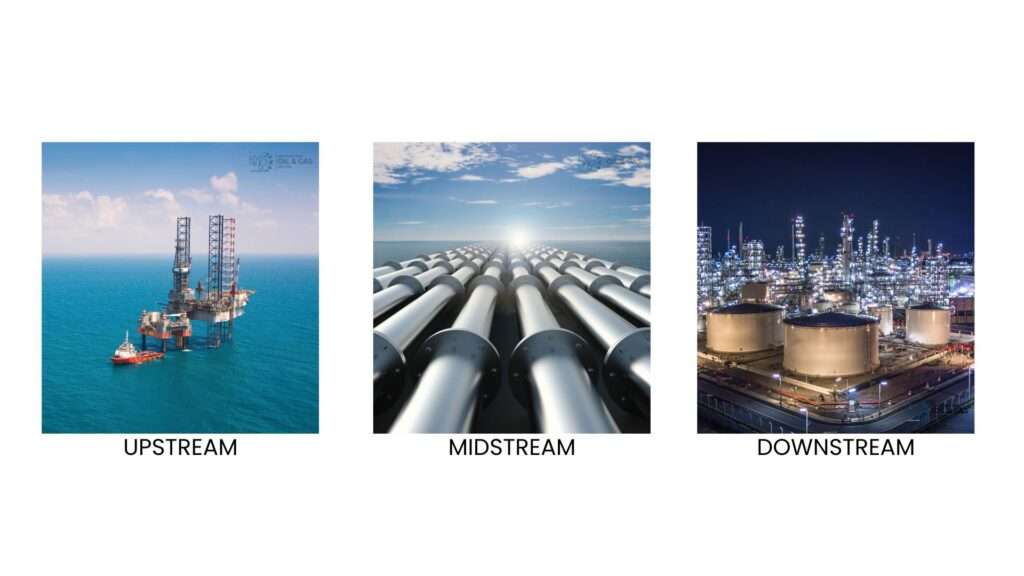SEARCHING FOR OIL & GAS JOBS OR LOOKING FOR A CAREER IN THE OIL & GAS INDUSTRY?
The oil and gas industry has always been in demand for every country around the globe and is considered one of the largest industries too. The industry is divided into the following 3 work sectors that produce hundreds of oil and gas jobs every year worldwide.
- Upstream
- Midstream
- Downstream
So, if you’re looking for a high-paying job, you should consider a career in the oil and gas industry because it’s the only one that’s continuously growing and can be one of the best options for a progressive and rewarding career. So don’t waste any more time and read this article full that enables you to get ready to prepare yourself for a professional and progressive career in this evergrowing industry!
Let’s begin by introducing the oil and gas industry.

What is Oil and Gas Industry?
The oil and gas industry is widely acknowledged as the world’s primary fuel source; it is also an important player in the energy market and has a significant impact on the global economy.
Because the oil and gas industry is regarded as critical to the global economy, every country in the world wishes to have oil and gas resources in order for their economy to grow, since countries with access to oil and gas resources have historically become wealthy.
Also, the oil and gas industry has been increasing steadily and is projected to continue doing so in the coming years. So, there is no doubt that the increased demand for oil and gas creates new opportunities for individuals who have the right qualifications and have obtained the necessary skills and certifications after completing the oil and gas training.
Play the video below to learn more about the oil and gas industry.
IS THERE A JOB AVAILABLE IN THE OIL AND GAS INDUSTRY FOR ME?
Absolutely, the oil and gas industry offers countless job possibilities around the world since oil companies require thousands of workforces to extract, produce, transport, and sell petroleum products such as gasoline, natural gas, and crude oil.
So, if you want to work in the oil and gas industry, you can have several options to choose from. Some career and job options in the oil and gas industry are as follows:
- Well Drilling
- Surveying
- Geologist
- Rigging
- Pipeline
- Quality
- Safety
- Plant construction
- Maintenance
- Shutdown

WHAT JOBS ARE AVAILABLE IN THE OIL & GAS INDUSTRY FOR ENGINEERS?
Engineers and degree/diploma holders are in high demand in every work sector of the oil and gas industry, including upstream, midstream, and downstream.
The jobs for engineers in oil and gas include those involved in oil and gas extraction to refining and distribution and selling of refined products.
Engineers working in the oil and gas industry may have a variety of work locations to choose from, these include;
- Offshore platforms
- Desert
- Floating vessels or ships
- Refineries
- Distribution and delivery of refined products
Let’s take a look at some of the most common jobs for engineers in the oil and gas industry, organized by the work sector.
UPSTREAM jobs for engineers in the oil and gas
Engineers in the UPSTREAM work sector perform exploration activities such as geological surveys to search for oil and gas (hydrocarbons), build drilling rigs for drilling, and perform production activities such as drilling operations in either onshore or offshore locations to bring the oil and gas from oil reservoir to land.
Some popular upstream jobs and roles for engineers include;
- Production Engineer
- Drilling Engineer
- Reservoir Engineer
- Facility Engineer
- QA QC Engineer
- HSE Engineer
- Welding Engineer
- Coating Engineer
MIDSTREAM jobs for engineers in the oil and gas
Midstream engineers are responsible for constructing pipeline and pumping systems, and storage facilities to transport and store oil and gas extracted from the upstream sector.
Engineers in midstream undertake site assessments, design pipelines, and storage tanks, and then fabricate and install them.
They also optimize midstream assets, such as rotating equipment size evaluations for pumps, fluid flow calculations, system pipeline hydraulic modeling, the development of Salt Water Disposal (SWD) facilities, and the like.
Engineers in the oil and gas midstream work sector also execute maintenance and repairs on pipes, tanks, and pumping systems, as well as carry out inspection and quality control tasks during the construction and maintenance work phase. Some popular oil and gas midstream jobs include;
- Pipeline engineer
- Coating Engineer
- Welding Engineer
- HSE Engineer
- QA QC Engineer
- Planning Engineer
- Insulation Engineer
- Mechanical Engineer
DOWNSTREAM jobs for engineers in the oil and gas
Engineers in the downstream sector assist in the refinement of crude oil, the processing and purification of raw natural gas, and the marketing and distribution of refined or processed products.
The development of oil refineries, petroleum, and petrochemical plants, which generates hundreds of thousands of jobs in the oil and gas industry, is the popular work phase of the midstream sector.
These built oil and gas facilities process and transform crude oil or gas into a variety of products, including;
- Fuels
- Lubricants
- Kerosene
- Other usable products produced from petroleum and petrochemicals
Some popular oil and gas downstream jobs include;
- Piping Engineer
- Insulation Engineer
- Mechanical Engineer
- Structural Engineer
- QA QC Engineer
- Coating Engineer
- Welding Engineer
- NDE Engineer
- Passive Fire Protection Engineer
Now that you’re aware of the various engineering jobs or career prospects available in the oil and gas industry, the next thing to do is to select oil and gas careers and job positions that may suit you even if you don’t have an engineering degree, keep reading.
THE AVAILABILITY OF THE JOB ROLES IN THE OIL AND GAS INDUSTRY
When it comes to getting jobs in the oil and gas industry with suitable job positions and roles, you should keep in mind that getting oil and gas jobs will always be dependent on your academic qualifications, oil and gas training, and certification to handle a role in a specific oil and gas work area.
So, depending on your oil and gas skills and qualifications, you may have one of the following jobs in the oil and gas upstream, midstream, or downstream work sector;
- Technician or applicator jobs
- Rigging jobs
- Surveyor jobs
- Geologist jobs
- Operator jobs
- Foreman jobs
- Supervisor jobs
- Quality controller or QA QC jobs
- HSE Officer jobs
- Manager jobs
- Discipline Engineer Jobs
Now that you’re aware of the many jobs and roles available in the oil and gas industry, you may now read out what oil companies do in the specific work area in which they operate.
OIL AND GAS WORK AREAS THAT PRODUCE OIL AND GAS JOBS?
Depending on the work area that a company operates in, there are numerous jobs available within the companies in the oil and gas, the most prevalent ones are as follows:
Exploration
The people in this work area are in charge of discovering new oil and gas reserves. They use a variety of techniques, including seismic surveys and drilling, to identify possible locations where oil and gas may be found.
Drilling
The drilling people are in charge of drilling wells to obtain oil and gas from the earth or beneath the sea. This involves operating various drilling rigs and equipment, as well as working with other departments to ensure that wells are drilled safely and efficiently.
Production
Once a reserve is discovered, the production people are in charge of extracting the oil and gas. They extract crude oil from the ground following a variety of techniques and procedures, including drilling and fracking.
Transportation
The transportation people are in charge of transporting oil and gas from producing sites to storage or refineries. This includes driving various modes of transportation and collaborating with other departments to guarantee safe and efficient transportation.
Storage
The storage people are in charge of storing oil and gas before refining or selling it. This includes operating storage tanks and other storage facilities, as well as collaborating with other departments to guarantee safe and efficient storage.
Refining
The refining people are in charge of converting raw oil and gas (crude oil) into useable products like gasoline and diesel. They construct oil and gas plants to refine crude oil and gas into usable products using a variety of techniques including distillation and cracking.
Marketing
The marketing people are in charge of distributing and selling refined products from crude oil to the end-user or customers. To market things to customers, they employ a variety of advertising and promotion strategies.
Now that you’ve decided to pursue a career in the oil and gas industry, but want to learn more about the necessary skills and oil and gas training that you’ll need to acquire/attend, you should enroll in The Institute for Oil & Gas Sector’s oil and gas jobs and career guide course. For more details on the course, continue reading.
LOOKING FOR PROPER GUIDANCE FOR OIL & GAS JOBS OR CAREERS?
As you now know that the oil and gas industry provides a diverse range of career opportunities and allows individuals to work in a variety of locations around the world. Depending on your oil and gas training and certifications, you get the opportunity to work in oil refineries, petrochemical plants, pipelines, offshore rigs, floating vessels, and so on.
So, if you want to make your career in the oil and gas, petroleum, or petrochemical industries, the first step that you should take is to study the Oil and Gas Jobs and Career Guide (ONGC) course, which is designed and delivered by the Institute for Oil and Gas Sector, IOGS.
Continue reading to know more about the Oil & Gas Jobs and Career Guide Course.

What Does the Oil & Gas Jobs and Career Guide Course Cover?
The Oil & Gas Jobs and Career Guide Course contains all you need to know about the oil and gas industry. The course assists you in gaining all of the necessary information to make the right decision to begin your career in the oil and gas industry with confidence.
The information that the oil and gas jobs and career guide course includes but is not limited to the following;
- Understand the oil and gas industry in a better way
- Discover the 3 key elements for a successful career in the oil and gas
- Know the 4 essential skill categories
- And familiarize yourself with the world’s popular oil and gas training and certifications that you would need to obtain
Why Do I Need Proper Guidance to Start a Career in Oil and Gas?
Everyone needs some kind of guidance or mentorship in their personal or professional lives because the right guidance or mentoring can lead to success. So, when you study the oil and gas jobs and career guide course you will gain the knowledge and understanding you need to kick-start a successful career in the oil and gas world.
Remember that only by understanding the oil and gas industry in a better way, developing the necessary skills, and obtaining the necessary oil and gas qualifications or certifications you’ll be able to start a professional and progressive career in the oil and gas or petroleum industry, which is what the oil and gas jobs and career guide course provides.
Why Oil & Gas Jobs and Career Guide Course?
The oil and gas jobs and career guide course is the only course that provides you with the right information and knowledge to make the right decision and helps you start or advance your career in oil and gas with confidence. You may also watch the video below to have a better idea of why the oil and gas jobs and career guidance course is essential for you.
DON’T WASTE TIME, GET TRAINING FROM THE OIL & GAS INSTITUTE
The Institute for Oil and Gas Sector, also known as IOGS, is one of the most reliable and industry-foremost oil and gas sector educational institutions. Over the years, IOGS has designed and delivered comprehensive, standardized, quality-assured, and results-oriented oil and gas training and certification courses to educate the youth population as well as industry professionals in different work areas of the oil and gas industry.
The Institute for Oil and Gas Sector offers oil and gas training and certification courses to build the necessary oil and gas job skills in the oil and gas work areas listed below:
You can study with IOGS if you intend to begin a professional and progressive career in the oil and gas industry’s upstream, midstream, or downstream work sectors. The Institute for Oil & Gas Sector’s website is www.iogs.org; you can visit the institute’s website to discover more about the courses provided.
CONCLUSION
We hope you receive what you need about the oil and gas industry, available career possibilities, oil and gas jobs, necessary skills to develop, and oil and gas certifications to obtain in order to start or advance your career in the oil and gas world.
Related Articles
What You Need To Know About Employment in the Oil and Gas Industry











